- Home
- Lynn Shurr
Queen of the Mardi Gras Ball
Queen of the Mardi Gras Ball Read online
Table of Contents
Title Page
Praise for Lynn Shurr
Queen of the Mardi Gras Ball
Copyright
Dedication
Chapter One
Chapter Two
Chapter Three
Chapter Four
Chapter Five
Chapter Six
Chapter Seven
Chapter Eight
Chapter Nine
Chapter Ten
Chapter Eleven
Chapter Twelve
Chapter Thirteen
Chapter Fourteen
Chapter Fifteen
Chapter Sixteen
Chapter Seventeen
Chapter Eighteen
Chapter Nineteen
Chapter Twenty
Chapter Twenty-One
Chapter Twenty-Two
Chapter Twenty-Three
Chapter Twenty-Four
Chapter Twenty-Five
Chapter Twenty-Six
Chapter Twenty-Seven
Chapter Twenty-Eight
Chapter Twenty-Nine
Chapter Thirty
Chapter Thirty-One
Chapter Thirty-Two
Chapter Thirty-Three
Chapter Thirty-Four
Chapter Thirty-Five
Chapter Thirty-Six
Chapter Thirty-Seven
Chapter Thirty-Eight
Chapter Thirty-Nine
Chapter Forty
Chapter Forty-One
Chapter Forty-Two
Epilogue
A word about the author…
Thank you for purchasing this publication of The Wild Rose Press, Inc.
“Doing a good business today, Anna-Marie?” she heard her masked man ask.
“No rest for the wicked, Doctor Pierre. Eh, you want a room? I won’t tell JoJo. He don’t count the sheets I wash. Lucky number seven, she’s all made up and ready to go. I got the key right here. Some lagnaippe for taking care of my girl when she got the clap.” The yellow woman tossed her load of soiled linens into a basket and took a set of fresh sheets from a pile stacked on one of the bar’s bentwood chairs. Draping her burden over one arm, she fished in her apron for the key and dangled it before him.
“Not today, Senora, but you have my thanks.”
“Yes,” said Roz as she came up behind him. “Yes, we want the key.”
She stroked the dark hair at the nape of his neck and recognized the same small shiver she had gotten out of him on the balcony of the Yacht Club.
“Ah, you should take the room. It’s Mardi Gras, and who knows when you will have another chance with the gypsy lady, eh?” Anna-Marie said, still dangling temptation.
“You’re sure. You must be sure,” he said to Roz so seriously, his breath hot against her cheek.
She took the key for him and led the way to number seven.
Praise for Lynn Shurr
“Shurr is a wonderful story teller.”
~The Romance Studio
*
“I can attest to the fact that Lynn Shurr knows her subject matter. Her grasp of Crescent City customs, particularly the social swirl surrounding Mardi Gras, is top-notch…Colorfully written, engaging and often poignant, ‘Queen’ doesn’t let up until Roz gets things settled to her satisfaction.”
~Ashton Lee, author of
The Cherry Cola Book Club
*
“Very easy reads, well written, combined with conflict, believable plots and secondary characters that make the story come alive.”
~Jane Lange, Romances, Reads and Reviews
*
“Lynn Shurr stories have that distinctive Louisiana flavor…and make you eager for another taste.”
~Jeff Salter, author
Queen of the Mardi Gras Ball
by
Lynn Shurr
The Mardi Gras Series
This is a work of fiction. Names, characters, places, and incidents are either the product of the author’s imagination or are used fictitiously, and any resemblance to actual persons living or dead, business establishments, events, or locales, is entirely coincidental.
Queen of the Mardi Gras Ball
COPYRIGHT © 2015 by Lynn Shurr
All rights reserved. No part of this book may be used or reproduced in any manner whatsoever without written permission of the author or The Wild Rose Press, Inc. except in the case of brief quotations embodied in critical articles or reviews.
Contact Information: [email protected]
Cover Art by Diana Carlile
The Wild Rose Press, Inc.
PO Box 708
Adams Basin, NY 14410-0708
Visit us at www.thewildrosepress.com
Publishing History
previously published by L & L Dreamspell, 2012
First Mainstream Historical Edition, 2015
Print ISBN 978-1-62830-873-0
Digital ISBN 978-1-62830-874-7
The Mardi Gras Series
Published in the United States of America
Dedication
For my mother, Joan Shurr,
who shared with me her stories of growing up
in the 1920s
Chapter One
New Orleans, 1925
“Reigning as queen was simultaneously a rite of passage, an act of submission, and a mark of honor. Participation in the Carnival courts was the outward and visible sign that a daughter was conforming to the demands that “society” placed upon her…A woman became Carnival queen when she was a girl; queenhood ended her childhood. After she was queen she might go on to become a woman, a wife, a mother.”
~Reid Mitchell, All on a Mardi Gras Day
A stiff wind ripped across the Mississippi picking up moisture as it came. Chilly and damp, it crossed over the levee and descended into Jackson Square, driving the vagrants from the park benches and into the doorways of the Pontalba Apartments. Burke Boylan and Artemus Delamare, having walked most of the length of Bourbon Street looking for action, were now revising their plans under a street lamp on the corner of the old parade grounds.
“Who would have thought bawdyhouses close early on Christmas Eve?” Boylan said in a frustrated voice. He drew a silver hip flask engraved with the Greek letters of his fraternity from a pocket, unscrewed the cap, and took a warming sip.
Artie held out his hand. “I suppose even whores have families and enjoy an evening off.”
He received the silver flask and took a swig after wiping the mouthpiece on the sleeve of his raccoon coat. “Great hooch! Where did you get it?”
“I had them fill it up at the Holland House, best booze in town. The stuff they make here in the Quarter is all rotgut.”
Artie passed the mouth of the flask over his coat sleeve again and returned it to his buddy who plucked two hairs from the opening before replacing the cap.
“I prefer my liquor without added ingredients, Delamare. By the way, you look ridiculous in that coat.”
“Ridiculous but warm. Besides, it’s the cat’s meow right now. Where to next, my friend?”
“Plenty of automobiles parked around here tonight,” Boylan observed.
“Midnight Mass. All the good, or rather the best people, are packed into old St. Louis Cathedral having their souls attended to. They should let out in a half hour and scurry off to a reveillon to stuff their faces before sleeping in Christmas morning.”
Boylan looked up at the ancient cathedral, its stained glass windows ablaze, as if he had just noticed its existence. “Reveillon?”
“You took to the vice around here so easily I keep forgetting you come from Philadelphia. It’s an old Creole custom to gorge at home after Christmas Eve Mass.�
��
“Sounds like a party to me. I think my mother mentioned it once, but in Philadelphia we do as Philadelphians do—go to bed early. Can we get invited?”
“If you are willing to spend some time on your knees, Brother Boylan.”
“Lead the way, Artie.”
Artie fished in his coat pocket and withdrew two peppermints, a bit fuzzy but edible. “Won’t do to offend with our breath before we even get started on an invite.”
Burke accepted the questionable candy and followed Artie across the slick, damp slates to the church.
Heads turned at the rear of the congregation as the cathedral doors thumped open and shut. More than a few worshipers grumbled when the two young men pushed into an already crowded pew with Artie and his coat taking up twice the space he should have. At the far end of the church, the priest raised the chalice and glorified the blood of Christ in Latin. Most people were on their knees. Burke and Artie joined them. As the first rows moved sluggishly toward the communion rail, Burke surveyed the crowd and sharpened his wit on a few of them.
“Would you look at that grande dame, her chest pushed out like a pouter pigeon. Doesn’t she know corsets are out of style? But the next woman—ooh-la-la—a Madonna, meek and mild, in a black lace shawl, the golden hair, the pure white skin, the rosy cheeks, the bee-stung lips.”
The people just in front of the young men shushed. Artie whispered directly into Burke’s ear. “Rosamond St. Rochelle, daughter of the pouter pigeon, very old Creole family, but I’ve heard she’s a wild child, not a Madonna.”
“Do the St. Rochelles have a reveillon?”
“One of the best in town. They live over on Esplanade in one of the old French mansions.”
“Then, that’s where we will be going.”
“I’ll do my best.”
The two young men slipped from their pew just before the recessional and took up a post by the side of the cathedral doors. As Rosamond’s family exited, Artie stepped forward, hand extended toward a prosperous and substantial older man wearing a black topcoat and a banker’s homburg hat. His wife, her chest made even larger by the huge fur collar of her wrap, paused by his side as the two men shook.
“I’m Artemus Delamare. I believe you are acquainted with my father, Cornelius Delamare, from the Boston Club. This is my fellow Tulane law student and fraternity brother, Burke Boylan of Philadelphia. He is unable to be with his family this holy season, and I was hoping to introduce him to one of our charming local customs, the reveillon.”
While the husband digested this speech, his wife took charge. “Why, we would be delighted to have two future attorneys join us, wouldn’t we, Rosamond?”
She drew her daughter forward. Rosamond had allowed the black lace shawl to slip to her shoulders as she left the cathedral. Her wrap was so large it draped over most of her pearl gray dress with its de rigueur dropped waistline. Still, Burke caught a glimpse of fine silk undergarments beneath the filmy, almost transparent fabric ornamented by a large pink rose on one hip. Rosamond’s baby blue eyes crinkled merrily at her mother’s obvious ploy to introduce her to yet another eligible young man.
“My daughter, Rosamond Grace St. Rochelle. Rosamond is studying the fine arts at Newcomb College.”
Rosamond tilted her lovely head with its marcelled waves of blonde hair extending to the bun at the nape of her neck. She extended her hand elegantly. Boylan seized it. “Charmed to meet you,” he claimed.
A rustling noise sounded behind Rosamond, then the impatient stamp of patent leather shoes. A girl of about twelve pushed forward. She wore a shawl like her sister, but it was white and covered her from head to toe. “May we go now? I’m getting cold.”
“My younger daughter, Roxanne Marie, who is lacking in manners this evening.” Madame St. Rochelle gave the child a frown.
Artie removed one of the child’s hands from the tangle of the shawl and gave it a light shake. “Looks like it’s you and me, baby,” he said in a joking undertone.
Roxie’s dark eyes lit. She let the shawl drop seductively to her shoulders in imitation of her sister and revealed that she still wore her hair in long, brown pigtails tied at the ends with white ribbons. “I like you. You’re funny, and so is your coat.”
“So I’ve been told. Tell me, Miss Roxie, would you have room in your flivver for two equally chilled Tulane men?”
“We don’t have a flivver. We have an Auburn Touring Car,” the girl answered seriously. “Please, Papa, may they ride with us?”
“I suppose I wouldn’t leave a dog out on a night like this. Of course, you gentlemen are welcome to ride with us.”
As the St. Rochelles and their company waited for their chauffeur to inch the Auburn through the post-Mass traffic to where they stood, two men wearing dark fedoras and black suits passed nearby. The taller had the same build as Rosamond’s father, but less paunch, the same blond hair going gray at the sides, the same light eyes. A family member, then, Boylan calculated.
The other much younger man was slim of body, olive-complected with high cheekbones sharp enough to cut diamonds, and large, dark eyes. A rival for the attention of the fair Rosamond, Boylan assessed, since the fella’s eyes skipped over the rest of the family and went right to her pretty face.
Mr. St. Rochelle called out, “Gilbert, my brother, you are coming to the reveillon?”
“But of course, Laurence. I have no desire to be alone tonight. First, I must take my colleague back to his digs. It’s too nasty a night for walking.”
“Bring him along by all means. Any friend of yours is welcome.”
Mrs. St. Rochelle viewed her newest guest with hawk-like brown eyes disguised by the fleshiness of her face. She intended to reel in another suitor for her daughter, Burke could tell.
“Pierre Landry, M.D. I would be honored to attend,” the young doctor said in some sort of Frenchy accent.
Mrs. St. Rochelle’s eyes narrowed. She disliked something about Landry. Boylan felt triumphant. The touring car arrived at that moment. The chauffeur jumped out to open the doors and pack the family and their guests into the auto.
The ride was brief. A servant stood waiting at the door to take their coats and hats. More servants waited in the large formal dining room, all dark mahogany, white linen, and shining silver. Black faces above red bow ties and white dinner jackets smiled in welcome.
As the house filled with other guests, the servants lifted lids of silver chafing dishes, releasing gusts of steam and the scent of well-spiced meats and fresh seafood. They spooned out generous portions onto china plates.
“Oyster chowder, suh?” The first Negro held up his ladle and a small soup cup.
“I don’t care for oysters. Slimy devils.” Burke moved along the line.
“Grits and grillades, suh? Rabbit salmis? Crab cakes?”
Burke eyed the snowy grits and meaty gravy, the meat pies and browned patties. “No. I’ll just have a slice of that ham, a serving of the eggs, some fried potatoes, a piece of that French bread.”
Behind Boylan in the line, Pierre Landry accepted small portions of all offered to him. His own mother had no patience with people who picked over their food. Having enough to eat was God’s blessing, and what was served made no never mind. One gave thanks and ate fast before the rest of the children grabbed what was placed on the table. But then, Boylan, a privileged bounder, had looked at the St. Rochelle’s golden daughter as if she were a piece of decorated cake that only a wealthy man could partake of.
Hot cocoa and rich, black coffee laced with chicory stood available in urns on the sideboard. Enough small French pastries to stock a bakery were arranged in tiers around the beverages. Boylan popped a bite-sized éclair into his mouth and searched the room for Rosamond. Not seeing her, he wandered into the hallway where guests still arrived. Beyond the dining room, a dark carved mahogany door opened and closed. The aroma of fine cigars and brandy wafted over him, the smell of affluence and power. Burke drifted in that direction until he heard Madame St
. Rochelle admonishing her daughters who had perched themselves on the central staircase to eat their feast.
“Rosamond, you have eaten enough. Please go into the parlor and entertain our guests at the piano. Roxanne, finish your plate, then go up to bed.”
“Yes, Mama,” the girls answered in unison.
Rosamond set aside a plate still piled with grits and grillades and took a small sip of her cocoa. She rolled her eyes at Burke as soon as her mama turned her back. Roxanne held a finger to her lips, then slid down the steps and disappeared into the crowded parlor. Rosamond followed, drawing Burke after her.
He passed Dr. Landry who held a plate piled high with a dab of all the food offerings. Boylan thought the man ate like one who seldom had access to good, rich food. The doctor savored every bite—and looked at Rosamond with hungry eyes.
Seating herself at a well-tuned Playel upright, Rosamond picked out the notes of Silent Night and sang softly in a pleasant, but not superior voice. The younger set separated from their parents and gathered round to join in the song. Burke shoved through the group to claim the honor of turning the pages of music for the pianist.
But damn, that annoying doctor had put down his plate and followed. In the excellent electric light of the parlor chandelier, Boylan had to concede that his competition was darkly handsome. Black hair slicked straight back with oil, dusky eyes fixed on the St. Rochelle’s oldest daughter, Landry leaned with casual grace against the side of the piano. Artie, much smaller without his coat, bent over and murmured a request in Rosamond’s ear.

 Sinners Football 02- Wish for a Sinner
Sinners Football 02- Wish for a Sinner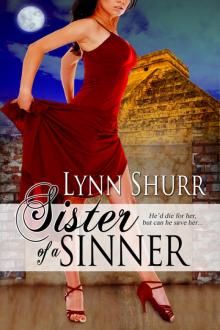 Sister of a Sinner
Sister of a Sinner Courir De Mardi Gras
Courir De Mardi Gras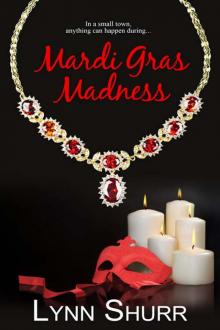 Mardi Gras Madness
Mardi Gras Madness Paradise for a Sinner
Paradise for a Sinner Putty in Her Hands
Putty in Her Hands Son of a Sinner
Son of a Sinner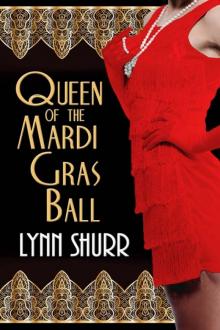 Queen of the Mardi Gras Ball
Queen of the Mardi Gras Ball Love Letter for a Sinner (The Sinners sports romances)
Love Letter for a Sinner (The Sinners sports romances) A Wild Red Rose
A Wild Red Rose Sinners Football 01- Goals for a Sinner
Sinners Football 01- Goals for a Sinner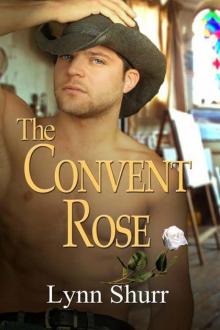 The Convent Rose (The Roses)
The Convent Rose (The Roses)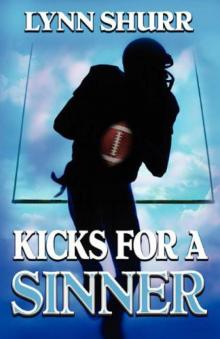 Kicks for a Sinner S3
Kicks for a Sinner S3 She's a Sinner
She's a Sinner